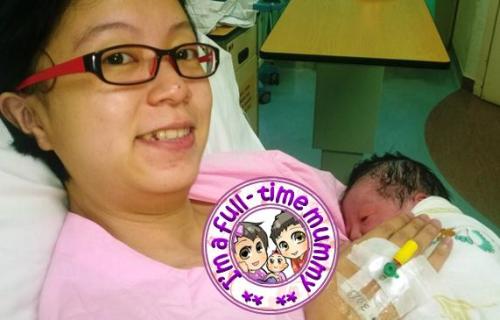I started my breastfeeding journey since March 2009, when our 1st child was born and I never stopped breastfeeding since then. I breastfed our 1st child past 1, 2, 3 years old, throughout my 2nd pregnancy, then went on to tandem nursed our first 2 kiddos for 1.5 years until our 1st child self-weaned at 45 months old. As for 2nd child, she is still nursing right now at 2 years old, I nursed through my 3rd pregnancy and currently tandem nursing our 2nd and 3rd child since 1st October 2013.
With all these experiences gained in my breastfeeding journey, I decided to pen down the critical phases which I think contributed to a successful breastfeeding journey.
For my 1st post, I will start off with: the 1st hour after giving birth to your baby.
Yes, a new mum will normally starts producing breastmilk around day 4-5 after labor but that does not mean you have to wait till day 4-5 to start breastfeeding! I will always advice new mums to start latching immediately after delivery! Even though your body has yet to start producing milk, starting on with the latching will send signals to your brain that, yes, your body need to make milk FASTER! And of course, latching early will also help baby to practise his latching technique and help YOU in your breastfeeding techniques too.
Here's a picture of me breastfeeding my half hour old baby Carolyn. If I have my camera or handphone with me I would've snapped an earlier photo but too bad, don't have them with me and can only rely on my hubby to take the picture (and he was busy answering calls and announcing to everyone on the arrival of our baby)

Now, the birth hospitals you are in also play a huge part in making sure you are off to a successful breastfeeding journey. If you are determined to breastfeed your child, please make sure you inform the hospital staff beforehand that you want your baby to be breastfeed and no formula feeding whatsoever. There are hospitals (private ones especially) which will feed formula milk to your baby so you need to make sure to inform the staff if you do not want this arrangement.
Also, do note that baby actually do not need feeding for the first 4-5 days. Think... our breastmilk comes on day 4-5, so Mother Nature intends for all things to be sync and work for each other in the right time. There is no need to panic that baby is hungry just because he/she is crying! Think, your baby has been comfortably coccooned in your womb for 9-10 months in total darkness, no sound, no smell etc and to be born suddenly into a world of bright lights, loud sounds, hot/cold environment etc of course baby will cry!
If you already caved into feeding formula to baby in the 1st hour itself, it is already jeopardising your breastfeeding journey! A newborn baby's stomach is VERY VERY small only and if you are not careful, you may overfeed the baby and too much feeding will expand baby's stomach and this is a vicious cycle. Stomach gets bigger with extra feeding, you need to feed more next round, so on and so forth.
There are new parents who, under pressure and influence from old folks will give in to supplementing with formula since mum is not 'able' to produce 'enough' breastmilk for baby. Do also take note that formula milk is made from cow's milk - milk meant for calf, not human baby. So it will take longer time for baby to digest the formula milk due to the higher protein content in the formula milk (which is easier to digest if it is drank by a calf) So we get the wrong perception that baby is sleeping well because he/she is taking formula milk compared to a baby who is taking breastmilk who wakes up more frequently - because human's milk is easily digested by baby and when a baby nurse, he/she will automatically stop when he/she is full (so no overfeeding here!)
To sum this post up:
Critical Phase For Successful Breastfeeding Journey : the 1st hour after giving birth to your baby.
-
Starting on with the latching will send signals to your brain that, yes, your body need to make milk FASTER!
-
Latching early will also help baby to practise his latching technique
-
Latching early will help YOU in your breastfeeding techniques too
- Please make sure you inform the hospital staff beforehand that you want your baby to be breastfeed and no formula feeding whatsoever
That's all for my 1st post in the critical phase for a successful breastfeeding journey!
Feel free to ask and share if you have questions or feedback!
